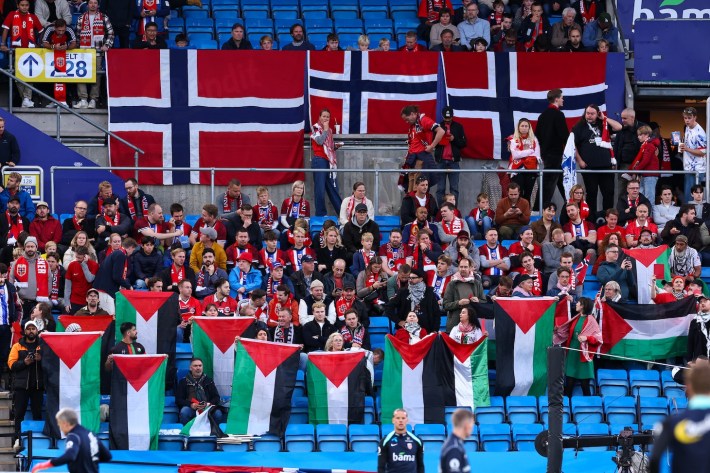In recent weeks, a steady stream of reports claimed that UEFA, the body that governs European soccer, was seriously considering banning Israel from international play. Off the heels of September's UN commission report that described the death and destruction Israel has wrought in Gaza as a genocide against Palestinians, UEFA finally saw fit to act—well, not to act, but to consider the possibility of acting.
In light of UEFA's previous reticence to do the thuddingly obvious by banning Israel's national and club teams from international competition, and thereby to uphold the precedent it had already set with its swift decision to freeze out Russian soccer after the invasion of Ukraine, it came as no surprise when subsequent reports revealed that UEFA's belated resolve was about as steely as single-ply toilet paper. Firstly, we learned not to expect any imminent action, as all of it was still at the discussion stage. Secondly, FIFA announced that it would recuse itself from the matter entirely, leaving it all up to UEFA. Thirdly, we discovered that UEFA's proposed ban would apply narrowly, only to UEFA competitions like the Euros and the Europa League, which would still allow Israel play in next summer's World Cup should they qualify—a decision no doubt inspired to some extent by the U.S. State Department saying it would fight any attempts to lock Israel out from the U.S.-hosted event. And finally, in spite of all that alleged momentum toward even a token punishment for Israel's belligerence and flouting of international law, UEFA more or less backed down completely, deciding against doing anything itself and to instead wait to see if the rumors of a breakthrough in the war's peace talks came through. With last Friday's ceasefire agreement, and the prospect of a more permanent end to Israel's war on the horizon, it is likely that any sanctions are now off the table.
This sucks! It is true that something like a ban from a couple soccer tournaments would be but a modest punishment for two years of murder, starvation, and devastation, but token acts like that aren't nothing. Sporting sanctions are acknowledgements that something is wrong in the world, and when that's the case, the world, and especially the world's aggressors, shouldn't be allowed to just go on as if nothing was happening. It's also true that it's a little foolish to seek justice from UEFA and FIFA, two infamously corrupt groups that are nobody's idea of moral authorities. Nevertheless, it is legitimately gross to see all the accommodations—the extreme in-stadium security measures, the deployment of riot police in response to the inevitable protests, the hosting of some racist and bloodthirsty fans—people and places are forced to make just so that representatives of a genocidal country don't get their feelings hurt. It is right and good to demand the sporting exclusion of Israel, to expect UEFA and FIFA to comply, and to be pissed off when they don't. UEFA's failure to act, hiding behind the idea that just because the worst parts of the violence may have stopped that everything's all good now, is reprehensible.
But where UEFA failed, thankfully Israel's opponents succeeded, saving us from the prospect at having Israel darken the best event soccer has to offer. After Tuesday's 3-0 loss to Italy, Israel is now officially out of the race for a spot in the 2026 World Cup. This was always going to be a crucial international break for Israel, as away matches against Norway and Italy, the two favorites to claim Group I's two qualifying spots, would make or break Israel's campaign. As was not too surprising, Israel lost both games big.
First came Saturday's match in Oslo. Before the game, thousands gathered downtown to march toward Ullevaal Stadium in protest of Israel's presence in these World Cup qualifiers. Inside the stadium—attendance of which was below full capacity because authorities closed several sections as a security measure—there were more Palestine flags than Norway ones, with fans also waving makeshift cards as part of the "Show Israel the Red Card" initiative. One of the big pregame banners in the stands read simply "Let Children Live."



The match itself was a one-sided affair, with Norway going 3-0 up inside of half an hour. The game eventually ended in a 5-0 home victory. Erling Haaland scored a hat trick.
The situation in Udine ahead of the Italy match was more of the same. There were reportedly more protestors outside the stadium than there were fans inside, since the stadium's 25,000 capacity was capped at about 16,000 for security reasons, and the Italian soccer federation said they only wound up selling about 9,000 tickets. The protests were mostly uneventful, outside of police, who were out in full force, using water cannons toward the end of the night when a small group of protestors tried to rush the barricades and get to the stadium. The match was only held in Udine in the first place because the logistics of the city and stadium made it easier for police to manage the expected crowds. The match was not particularly competitive. Italy didn't have much trouble sealing the 3-0 win that killed Israel's World Cup hopes.
Unlike the sentiment I saw in many of the memes going around, I personally can't muster much joy from seeing, for instance, Haaland dunk on a succession of Israel defenders en route to his hat trick. (Not to say that it isn't nice to see Haaland dunk on a succession of Israel defenders.) Reading the metaphor of international sports too literally runs the risk of trivializing the actual, real-life horrors we've seen in Gaza over the past two years. But in the same way that there is something worth being appalled at when seeing Israel's presence in international sporting events, and real value in showing up to the protests in Oslo or Udine to communicate that opprobrium and that solidarity with Palestinians, I am happy that Israel won't be rewarded for UEFA's and FIFA's cowardice with an opportunity to play in the World Cup next summer. Israel wouldn't have won the tournament anyway, but this way they also won't win the first big opportunity to get the rest of the world to forget everything they've done.






